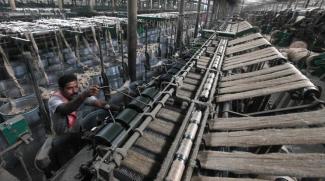Crisis in Jute Industry Looms Large
Jute Industry is again hogging the limelight in West Bengal, albeit, for all the wrong reasons. Despite a bumper crop of raw jute, the owners of jute mills are closing down mills one after another on the plea of a raw jute crisis. At a time when the third wave of COVID is ravaging the state in particular, more than 12 jute mills have shut down their operations, rendering thousands and thousands of workers jobless. Many more are operating with shorter and fewer shifts and reduced workforce.
The Jute Corporation of India (JCI), under the Ministry of Textiles, asked the jute industry to supply a huge amount of jute bags for packing paddy, wheat and sugar in due time, failing which, they were told that the existing ‘Mandatory packaging Act of Jute Materials’ would be diluted, giving way for synthetic packaging of these essential commodities. Whopping dues of PF-ESI-Gratuity default has already been plaguing this industry for the last couple of decades. At present, apart from a dearth of raw jute, scarcity of skilled workers has become an added problem because unattractive and very low wages is repulsing new workforce from joining this industry. A leading newspaper of the state carried a news item, with the title, "plenty of work in the Jute mills, but dearth of workers", in which this problem was highlighted.
The JCI declared and fixed the price of raw jute at Rs 6,500 per quintal. But according to the India Jute Mills Association (IJMA), the price of raw jute in the open market is Rs 7,500. The jute owners allege, hoarding of raw jute, artificial scarcity has a telling effect on the price of raw jute and it is beyond the capacity of jute mill owners to continue the production. In a written submission to the union government, IJMA appealed to policymakers to increase the price of raw jute, which was turned down by the government. All trade unions operating in jute mills have been continuously demanding that the state government should initiate a ‘de-hoarding’ drive and seize all raw jute held illegally with active co-operation from the JCI. Though some steps were taken to unearth such hoardings, it has failed to stem the rot. The fact is that many jute mill owners are also jute traders simultaneously and to extract a huge profit within a short period, they resort to all sorts of unscrupulous activities. Hoarding raw jute and extracting surplus premium is an age-old practice.
Engaging temporary and contract workers in perennial jobs sans PF-ESI and other statutory benefits, and dismissing workers summarily at the drop of a hat has become a major trend in this industry. Number of permanent workers is fast dwindling. Total anarchy in production process and medieval production relations has become a constant source of industrial unrest in this labour-intensive industry.
Trade unions have prepared a charter of demands to be placed before the IJMA and the state government and are planning to organise protest movements amid COVID restrictions. Preparations are on towards major struggles.

